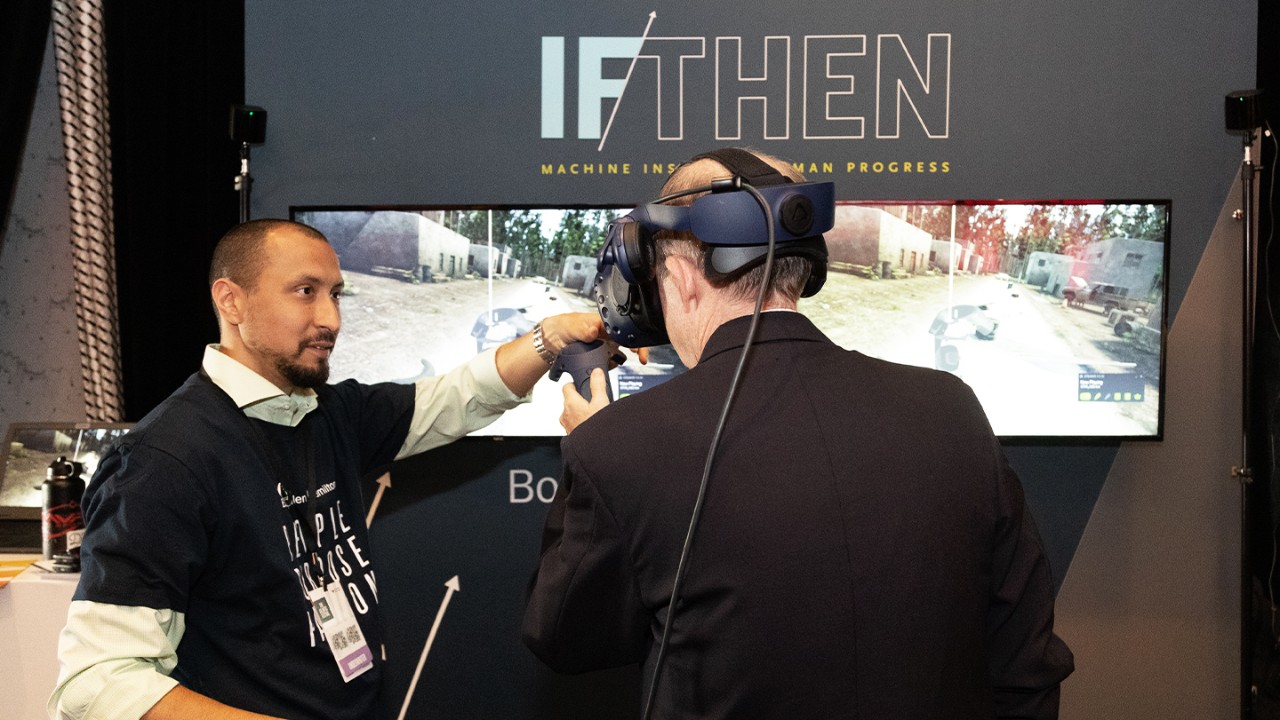Decisions that government and business leaders make today regarding artificial intelligence (AI) will have profound implications for the future of national and global security.
Allies and rivals alike are rapidly advancing and adopting AI and related technologies. To maintain and grow our AI advantage, we must act now.
In September 2019, Booz Allen sponsored The Atlantic Festival where we gathered military officials, policymakers, technology leaders, and leading experts to take a candid look at how the U.S. stacks up against the competition in national security, modern military readiness, and cybersecurity.
We took away these top insights:
1. The talent shortage could exceed the technology problem.
To be fully competitive against our near peers in AI capabilities, we must focus on training and attracting top talent, both now and in the future. Michèle Flournoy,* co-founder and managing partner of West Exec Advisors and former under secretary of defense for policy, suggested that an educated workforce starts with science, technology, engineering, and mathematics (STEM) education in school.
Representative William Hurd (R-TX) and Senator Martin Heinrich (D-NM) pointed out that by working with the federal government, technologists have an opportunity to solve problems most pressing to humanity.
Booz Allen President and Chief Executive Officer Horacio Rozanski said the government should focus “on AI as an investment and figure out how to create incentives” so that there is constant readiness and a constant supply of talent. “We need the capacity to defend ourselves,” he added.
*Michèle Flournoy is a Booz Allen Hamilton board member.
2. Synergy and trust must grow between the federal government and tech companies.
While there is competition for candidates between the public and private sector, everyone must be willing to work together to create the most effective and ethical AI. Citing past involvement with Project Maven, Lt. Gen. John N.T. Shanahan, Director, Joint Artificial Intelligence Center, said that to do the type of work the government wants to accomplish, “it involves academic, public, and private working together closely. That does require more work on both sides to understand what we’re really trying to achieve with our artificial intelligence.”
Horacio Rozanski mentioned that it’s imperative for the federal government to invest in AI; Booz Allen stands ready to facilitate the conversation between public and private sectors to identify opportunities for collaboration.
Kara Frederick, an associate fellow for the Technology and National Security Program at the Center for a New American Security, indicated that Congress’s role should be to address the ethical component of AI to “write the rules of the road. Otherwise, China is going to do it for us.” Representative Jerry McNerny (D-CA) echoed this idea saying, “The problem with Congress is it’s too slow, and the technology moves so fast. We have to put a framework in place and then just hold people accountable.”
3. Quickly implementing AI might give a short-term advantage to near peers, but incorporating ethics is the sound long-term strategy.
Senator Heinrich, co-founder of the Senate Artificial Intelligence Caucus, pointed out that “China is good at implementation, but they don’t have the same checks and balances we do.” Other panelists mentioned that some nations don’t value privacy and ethics on the same scale as the United States.
Lt. Gen. Shanahan emphasized that people need to understand that “if we can’t do it ethically, we won’t use AI.” Horacio Rozanski highlighted that Booz Allen unites specialists who understand mission with technologists at the cutting edge to ensure values and ethics are infused into the firm’s government and business solutions.
4. Preserving our digital future demands a human focus and investments in security awareness.
As cyber attackers transition from a “spray and pray” approach to highly targeted strategic attacks, we should all consider ourselves VAPs—“very attacked people.” Booz Allen Vice President spoke with Proof Point Executive Vice President Bhagwat Swaroop about the rise of social engineering (the use of deception and fraud to take advantage of confidential personal information), explaining that organizations need to invest more deeply in security awareness for employees—focusing on the human factor.
The panelists shared a few tips to move from a system-centric cybersecurity mindset to develop a people-centric strategy:
- Create and maintain an attack index of especially vulnerable individuals, which organizations can use to apply a set of unique controls for that specific group
- Invest in an agile response program since cyber attackers act in seconds and minutes as opposed to days and weeks
- Remember, we’re all targets. Take security precautions at work, home, and on the go. Avoid oversharing your important transactions on social media and be careful about sharing personal details with people you don’t know well.
5. Supporting diverse leaders will help unlock technology’s full potential.
If we are to truly create the future—it’s our people that will make the difference. We need to accelerate, develop, and advance women, including and encouraging diverse perspectives that help us uncover the best ideas.
Booz Allen's Global Defense Sector President Karen Dahut encouraged leaders to champion the idea of “like me” in the C-suite—women should be able to look up in an organization and see people who look like them. She reminded women to be courageous in finding strong mentors who provide an extra push, teaching young girls to focus on being brave (rather than perfect), and stepping out of their comfort zone to advance their careers.
To harness the power of AI to shape an age of exponential human progress, we must address the risks while embracing it quickly and strategically. Through this positive, yet proactive and ethical approach, we can use emerging technologies to unlock new possibilities in defense, government, and business.
